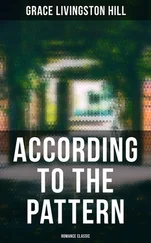“Where have you ben to, Miranda Griscom, and what on airth you ben up to now?” was the greeting she received as she lifted the latch of the old green kitchen door of her grandmother’s house.
Miranda knew that the worst was to come now, for her grandmother never mentioned the name of Griscom unless she meant business. It was a hated name to her because of the man who had broken the heart of her daughter. Grandma Heath always felt that Miranda was an out and out Griscom with not a streak of Heath about her. The Griscoms all had red hair. But Miranda lifted her chin high and felt like a princess in disguise.
“Ben huntin’ hen’s eggs down in the grass,” she said, taking the first excuse that came into her head. “Is it time to get supper?”
“Hen’s eggs! This time o’ night an’ dark as pitch. Miranda Griscom, you ken go up to your room an’ not come down tell I call you!”
It was a dire punishment, or would have been if Miranda had not had her head full of other things, for the neighbor had been asked to tea and there would have been much to hear at the table. Besides, it was apparent that her disgrace was to be made public. However, Miranda did not care. She hastened to her little attic window, which looked down, as good fortune would have it, upon the dining-room windows of the Spafford house. With joy Miranda observed that no one had thought to draw down the shades and she might sit and watch the supper served over the way,—the supper she had prepared,—and might think how delectable the doughnuts were, and let her mouth water over the currant jelly and the quince preserves and pretend she was a guest, and forget the supper downstairs she was missing.
Table of Contents
David made what apology he could for his absence on the arrival of his guests, and pondered in his heart who it could have been that they referred to as “the maid,” until he suddenly remembered Miranda, and inwardly blessed her for her kindliness. It was more than he would have expected from any member of the Heath household. Miranda’s honest face among the currant bushes when she had said, “You needn’t be afraid of me, I’ll keep still,” came to mind. Miranda had evidently scented out the true state of the case and filled in the breach, taking care not to divulge a word. He blest her kindly heart and resolved to show his gratitude to her in some way. Could poor Miranda, sitting supperless in the dark, have but known his thought, her lonely heart would have fluttered happily. But she did not, and virtue had to bring its own reward in a sense of duty done. Then, too, there was a spice of adventure to Miranda’s monotonous life in what she had done, and she was not altogether sad as she sat and let her imagination revel in what the Spaffords had said and thought, when they found the house lighted and supper ready. It was better than playing house down behind the barn when she was a little girl.
Marcia was the most astonished when she slipped down from her hurried toilet and found the table decked out in all the house afforded, fairly groaning under its weight of pickles, preserves, doughnuts, and pie. In fact, everything that Miranda had found she had put upon that table, and it is safe to say that the result was not quite as it would have been had the preparation of the supper been left to Marcia.
She stood before it and looked, and could not keep from laughing softly to herself at the array of little dishes of things. Marcia thought at first that one of the aunts must be here, in the parlor, probably entertaining the guests, and that the supper was a reproof to her for being away when she should have been at home attending to her duties, but still she was puzzled. It scarcely seemed like the aunts to set a table in such a peculiar manner. The best china was set out, it is true, but so many little bits of things were in separate dishes. There was half a mould of currant jelly in a large china plate, there was a fresh mould of quince jelly quivering on a common dish. All over the table in every available inch there was something. It would not do to call the guests out to a table like that. What would David say? And yet, if one of the aunts had set it and was going to stay to tea, would she be hurt? She tiptoed to the door and listened, but heard no sound save of men’s voices. If an aunt had been here she was surely gone now and would be none the wiser if a few dishes were removed.
With swift fingers Marcia weeded out the things, and set straight those that were to remain, and then made the tea. She was so quick about it David had scarcely time to begin to worry because supper was not announced before she stood in the parlor door, shy and sweet, with a brilliant color in her cheeks. His little comrade, David felt her to be, and again it struck him that she was beautiful as he arose to introduce her to the guests. He saw their open admiration as they greeted her, and he found himself wondering what they would have thought of Kate, wild-rose Kate with her graceful witching ways. A tinge of sadness came into his face, but something suggested to him the thought that Marcia was even more beautiful than Kate, more like a half-blown bud of a thing. He wondered that he had never noticed before how her eyes shone. He gave her a pleasant smile as they passed into the hall, which set the color flaming in her cheeks again. David seemed different somehow, and that lonely, set-apart feeling that she had had ever since she came here to live was gone. David was there and he understood, at least a little bit, and they had something,—just something, even though it was but a few minutes in a lonely woods and some gentle words of his,—to call their very own together. At least that experience did not belong to Kate, never had been hers, and could not have been borrowed from her. Marcia sighed a happy sigh as she took her seat at the table.
The talk ran upon Andrew Jackson, and some utterances of his in his last message to Congress. The elder of the two gentlemen expressed grave fears that a mistake had been made in policy and that the country would suffer.
Governor Clinton was mentioned and his policy discussed. But all this talk was familiar to Marcia. Her father had been interested in public affairs always, and she had been brought up to listen to discussions deep and long, and to think about such things for herself. When she was quite a little girl her father had made her read the paper aloud to him, from one end to the other, as he lay back in his big chair with his eyes closed and his shaggy brows drawn thoughtfully into a frown. Sometimes as she read he would burst forth with a tirade against this or that man or set of men who were in opposition to his own pronounced views, and he would pour out a lengthy reply to little Marcia as she sat patient, waiting for a chance to go on with her reading. As she grew older she became proud of the distinction of being her father’s confidante politically, and she was able to talk on such matters as intelligently and as well if not better than most of the men who came to the house. It was a position which no one disputed with her. Kate had been much too full of her own plans and Madam Schuyler too busy with household affairs to bother with politics and newspapers, so Marcia had always been the one called upon to read when her father’s eyes were tired. As a consequence she was far beyond other girls of her age in knowledge on public affairs. Well she knew what Andrew Jackson thought about the tariff, and about the system of canals, and about improvements in general. She knew which men in Congress were opposed to and which in favor of certain bills. All through the struggle for improvements in New York state she had been an eager observer. The minutest detail of the Erie canal project had interested her, and she was never without her own little private opinion in the matter, which, however, seldom found voice except in her eager eyes, whose listening lights would have been an inspiration to the most eloquent speaker.
Читать дальше












